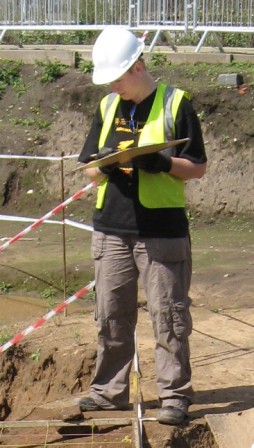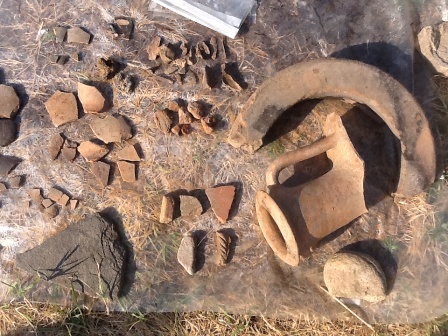Archaeology trials iPad for fieldwork study
Published on
[caption id="attachment_18420" align="alignnone" width="254"] Peta uses her iPad in the field[/caption]
Peta uses her iPad in the field[/caption]
Peta Bulmer, a Ph.D student from the Department of Archaeology, Classics and Egyptology is carrying out a study on the use of iPads for fieldwork.
In a joint project between the Department of Archaeology, Classics and Egyptology and the Computing Services Department, Peta will explore the use of mobile devices, whilst working ‘in the field’ on a number of sites across Europe, over the summer.
The iPad will be used to take photographs, make notes and sketches, and record data from digs, rather than collate them post trip, as is the norm. It is hoped that the flexible and portable nature of the device will enable speedier, more efficient and accurate recording and analysis of the data gathered onsite.
Peta selected a 64GB iPad 2, one of the most popular tablets in the marketplace, as her chosen mobile device. An additional stylus has been provided to enable sketch work.
Jake Gannon, Head of Systems and Applications, in Computing Services Department, said: "We were delighted when Peta approached us to see how we could support her academic endeavours in the field. We are very excited at the prospect of using Peta’s experiences to help us shape our existing services as well as develop new services and guidance for our student and research community."
As part of the study, Peta will use the iPad whilst digging at the ancient Greek site of Pistiros in Bulgaria, the medieval site of Poulton on the English - Welsh border, Delemere, and the Roman – Viking - medieval site at Hungate, near York. She will also be exploring the archaeology of ancient Kos.
Peta, said: "So far, the iPad has proved quite useful. It’s small and lightweight so easier to travel with than a laptop, and especially helpful when negotiating more physically challenging sites. It’s also handy to have readily available access to guidance documents such as recording conventions, and makes recording dig findings and data much less time consuming. Although I don’t have them at the moment, I can see the benefits of additional drawing and data packages."
On her return to the University, Peta will produce a report highlighting the benefits and drawbacks of using technology in the field. Once complete, a case study and guidelines will be made available on the CSD website.
CSD will make a series of recommendations based on the findings of the study, and will investigate how it can tailor its services to complement mobile devices such as an iPad. The development of a University of Liverpool fieldwork app is already being considered.
For more information, contact Jake Gannon on 794 4458 or by emailing Jake.Gannon@liverpool.ac.uk.
